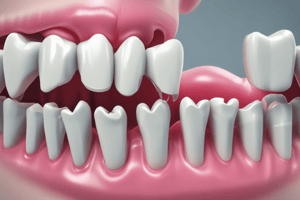Podcast
Questions and Answers
Who is considered the father of microbiology?
Who is considered the father of microbiology?
- Robert Hooke
- Antoine Philips van Leeuwenhoek (correct)
- Claude Bernard
- Edward Jenner
Which scientist proposed the concept that all species of life came from a single source?
Which scientist proposed the concept that all species of life came from a single source?
- Claude Bernard
- Edward Jenner (correct)
- Antoine Philips van Leeuwenhoek
- Louis Pasteur
Who is known for fostering the use of blind experiments to produce objective results?
Who is known for fostering the use of blind experiments to produce objective results?
- Claude Bernard (correct)
- Louis Pasteur
- Edward Jenner
- Antoine Philips van Leeuwenhoek
Which scientist believed that vivisection was useful in the study and practice of medicine?
Which scientist believed that vivisection was useful in the study and practice of medicine?
Who specialized in microbiology at the University of St. Andrews and the University of London?
Who specialized in microbiology at the University of St. Andrews and the University of London?
Which scientist created the process of pasteurization for treating milk and wine?
Which scientist created the process of pasteurization for treating milk and wine?
Who is credited with coining the term 'cell'?
Who is credited with coining the term 'cell'?
In which century did Robert Hooke live?
In which century did Robert Hooke live?
What material did Robert Hooke use to discover cells under a microscope?
What material did Robert Hooke use to discover cells under a microscope?
Which university did Robert Hooke attend for his higher education?
Which university did Robert Hooke attend for his higher education?
Which scientific law is attributed to Robert Hooke's work?
Which scientific law is attributed to Robert Hooke's work?
What did Robert Hooke discover using a microscope in 1665?
What did Robert Hooke discover using a microscope in 1665?
Who is credited with introducing the germ theory of disease?
Who is credited with introducing the germ theory of disease?
Which scientist's work paved the way for the idea of the land masses of Africa, South America, and those along the Atlantic Ocean being once joined together?
Which scientist's work paved the way for the idea of the land masses of Africa, South America, and those along the Atlantic Ocean being once joined together?
Who pioneered the work of antiseptic or sterile surgery by using carbolic acid to cleanse wounds and sterilize instruments?
Who pioneered the work of antiseptic or sterile surgery by using carbolic acid to cleanse wounds and sterilize instruments?
Which scientist specialized in botany and introduced the model describing random movements of cells known as Brownian motion?
Which scientist specialized in botany and introduced the model describing random movements of cells known as Brownian motion?
In which field did Louis Pasteur receive his education that contributed to his success in medical microbiology?
In which field did Louis Pasteur receive his education that contributed to his success in medical microbiology?
Which scientist believed in combining various branches of physical sciences such as biology, geology, and meteorology, leading to what is now known as Humboldtian science?
Which scientist believed in combining various branches of physical sciences such as biology, geology, and meteorology, leading to what is now known as Humboldtian science?
Flashcards are hidden until you start studying
Study Notes
Key Figures in Microbiology and Related Sciences
- Antonie van Leeuwenhoek is recognized as the father of microbiology for his pioneering work with microscopes.
- Charles Darwin proposed the concept of common descent, suggesting all species of life evolved from a single source.
- Pierre Curie is known for promoting the use of blind experiments to ensure objectivity in scientific results.
- Claude Bernard believed that vivisection was valuable for advancing the study and practice of medicine.
- Sir Alexander Fleming specialized in microbiology and worked at the University of St. Andrews and the University of London.
- Louis Pasteur developed the process of pasteurization, a method to treat milk and wine to eliminate spoilage and pathogens.
- Robert Hooke is credited with coining the term 'cell' after observing the structures in cork.
- Robert Hooke lived during the 17th century, specifically from 1635 to 1703.
- Hooke used cork as the material to discover cells under a microscope in his seminal work.
- Robert Hooke attended Christ Church, Oxford, for his higher education.
- Hooke's law of elasticity, which describes the proportionality of force to the extension of a spring, is attributed to his research.
- In 1665, Robert Hooke discovered and described the cellular structures in cork using a microscope.
Contributions to Germ Theory and Geosciences
- Louis Pasteur is credited with introducing the germ theory of disease, fundamentally changing hygiene and health practices.
- Alfred Wegener’s work laid the foundation for the theory of continental drift, suggesting that key land masses were once connected.
Advancements in Surgical Techniques and Scientific Models
- Joseph Lister pioneered antiseptic surgery by using carbolic acid to sanitize wounds and sterilize surgical instruments.
- Robert Brown specialized in botany and introduced the concept of Brownian motion, describing the random movement of microscopic particles in fluids.
Education and Interdisciplinary Science
- Louis Pasteur received an education that integrated his interests in chemistry and biology, forming the basis for his later contributions to medical microbiology.
- Alexander von Humboldt believed in the integration of various physical science branches, which contributed to the development of Humboldtian science, emphasizing the interconnectedness of nature.
Studying That Suits You
Use AI to generate personalized quizzes and flashcards to suit your learning preferences.




